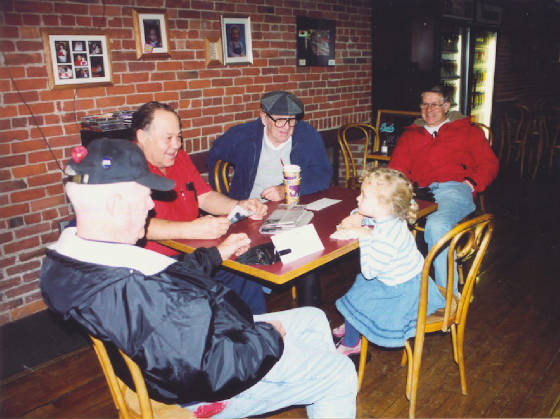On July 21, I celebrated the seventh anniversary of my first visit to North Adams. That was the Sunday that my wife and I drove up from Torrington, Connecticut, to look around and find out about a project called the Massachusetts Museum of Contemporary Art (Mass MoCA), which we had read about in our local newspaper. A year later, I had already written Steeples, and was preparing it for publication.
Despite living in Connecticut more than 25 years, and spending countless weekends driving around New England and taking walks in many cities and towns, we had never wandered into North Adams. I can remember driving every summer up Route 7 to Burlington, Vermont, to visit my brother. Invariably, we would take a quick detour on Route 2, steal an admiring look at Williams College, and then turn around in the Howard Johnson’s parking lot.
North Adams was quite a lovely surprise when we drove in over the Hadley Overpass. But on that Sunday in 1996, there was hardly a soul on the streets. Except for Gateway Clothing and McClelland’s, nothing was open. Still it was peaceful, and the mountains felt welcoming and comfortable as we walked around for several hours.
Return visits that summer and fall yielded plenty of complaints from older residents that there was “nothing to do,” and that the city had seen it best days. But the construction work over at Mass MoCA provided some hope, and I got a sense that something big was about to happen.
As I settled into my routine of driving up and hanging out about once a week at the Bean in the early morning, and taking extended walks all over the city, I discovered that one of the most appealing qualities that kept luring me back to North Adams was its quietness, and the sense of being transported to a simpler time. The city became a place to escape to when the hustle and bustle of work and modern life became too much for me.
But there was always that nagging fear in the back of my mind that Mass MoCA, if successful, would eventually sweep away that quietness, and North Adams would be propelled recklessly into the 21st century.
That hasn’t happened. Not yet. The museum, the tourists, the new restaurants and businesses, the Porches Inn on River Street, and the fresh faces on Main Street have brought life to a community that seemed pretty dreary seven years ago. And yet, I still enjoy quiet mornings at the Bean, and peaceful walks on the steep roads to the north and east.
Mass MoCA has provided an alternative, a balance to the slow and deliberate pace of small-town life, and we are better for it. As a dues-paying member, I am able to roam the galleries whenever they are open, something I do frequently. And even on the heaviest tourist days, the spaces are relatively serene, even haunting as they constantly remind me of their gritty industrial history. Like the city, the museum offers me another escape from the busy life.
It also offers plenty of reasonably priced performing arts events, such as concerts, dance parties, and classic movies (sometimes shown in an outdoor courtyard). So far this summer season, I have seen singer Rosanne Cash put on a spirited performance before a huge and excited crowd, laughed at one of Harold Lloyd’s funniest silent films while the Alloy Orchestra played a quirky original score, and viewed Creature from the Black Lagoon with 3-D glasses (remember them?).
The highlight for me was the Bang on a Can Marathon, a 6-hour non-stop concert of contemporary music performed by students of the Bang on a Can Summer Institute of Music, an annual 3-week music camp at the museum. The Bang on a Can All-Stars, one of the leading bands in contemporary music, run the Institute and are the principle teachers. They also performed at the event.
Although the concert took place entirely in the Hunter Center, outside speakers blasted the music into the courtyard by the upside-down trees, tables were provided, and food was cooked and served there. When I walked out for a dinner break about 5:30, it looked like Mass MoCA was putting on the world’s most eccentric backyard barbecue. On the way home, I told my wife, “Imagine this kind of thing going on in North Adams seven years ago.”
Yesterday, I got up at 5:30 and arrived at the Bean just as it opened. The streets were empty, except for an occasional driver speeding down Main on the way to work. The air was murky, and clouds hung low on the mountains. I ordered some pancakes, and waited for the old-timers to amble in. For nearly two hours, I drank coffee, listened to stories, heard a few familiar jokes, and watched my favorite town slowly wake up. It’s still quiet in North Adams. But how long will it be before the quietness is laid to rest?
Listening, poem by Joe Manning
Today is as gray
as a cold cup of coffee.
The old guys fill up the Bean,
but a little more slowly.
A train rumbles in the distance.
“Must be it’s gonna rain,
’cause I can hear the train.”
No one even nods.
The coffee cups sit on the table,
as still as the hands around them,
and it starts to rain.
Audrey breezes in
with wet hair.
“How you all doin’?”
No one says anything;
this morning,
everyone is listening.
|
|
